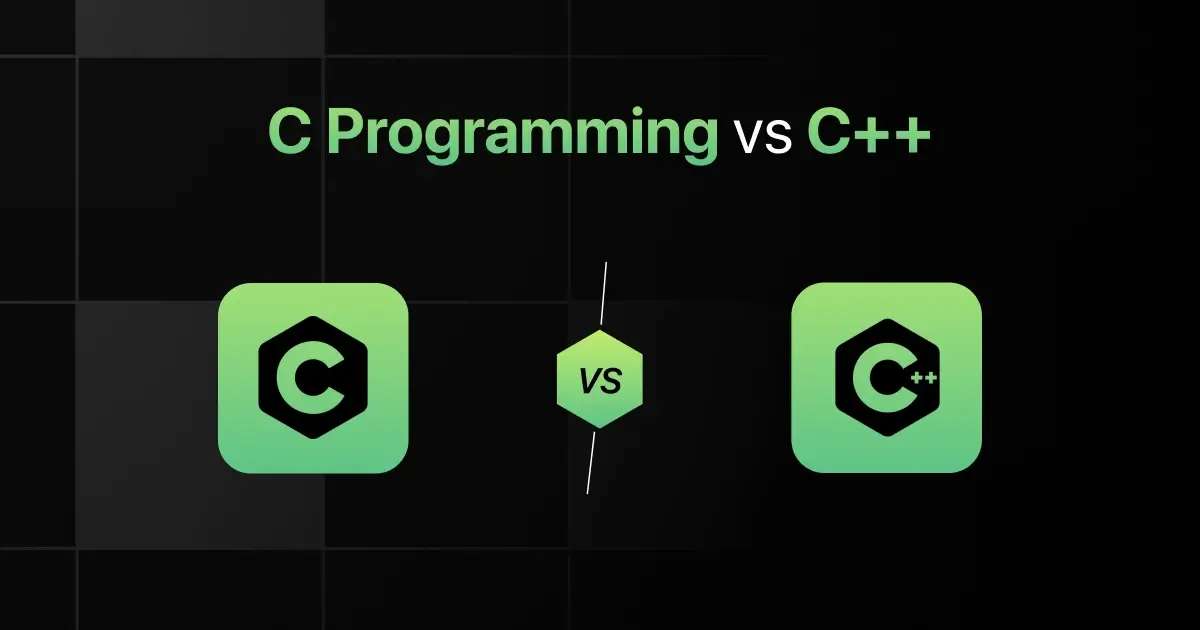C vs C++: Key Differences

When comparing C and C++, it’s important to look at what sets them apart. The discussion about C vs C++ is common among programmers deciding which language to use for their projects.
The question of C vs C++ which is better or C vs C++ which is best? depends on what you need for your specific project.
In this article let’s know the differences between C vs C++.
C vs C++: Understanding the Key Differences
To analyze C vs C++, it’s important to understand their design philosophy and runtime environments.
The key difference between C and C++ is that C is designed for procedural programming, making it ideal for applications where system-level resources, such as embedded systems, must be managed tightly. On the other hand, C++ builds upon C by adding support for object-oriented programming and features for generic programming.
The following are other major differences between C and C++:
| S. No. | Parameters | C Programming | C++ Programming |
|---|---|---|---|
| 1 | Developed By | Dennis Ritchie at AT&T Bell Labs | Bjarne Stroustrup at Bell Labs |
| 2 | Release Year | 1972 | 1985 |
| 3 | Paradigm | Procedural | Multi-paradigm (procedural, object-oriented, generic) |
| 4 | Syntax | Simple and straightforward | Complex, supports OOP and templates |
| 5 | Performance | Generally faster due to simplicity | Slightly slower, more features |
| 6 | Applications and Use Cases | Systems programming, embedded systems | Systems/software applications, game development |
| 7 | Learning Curve | Easier, fewer features to master | Steeper, due to OOP and standard libraries |
| 8 | Libraries and Frameworks | Standard C library | Standard Template Library (STL) and others |
| 9 | Platform Independence | Highly portable across platforms | Portable, but some features depend on the compiler |
| 10 | Concurrency and Multithreading | Libraries like POSIX threads | Built-in support from C++11 onwards |
| 11 | Tooling and IDE Support | A wide range of tools and IDEs | Extensive tools and IDE support. |
| 12 | Memory Management | Manual memory management | Manual with RAII, smart pointers |
| 13 | Error Handling | Basic error handling with errno | More sophisticated with exceptions |
| 14 | Security | Minimal built-in security features | More features like type safety, exceptions |
| 15 | Scalability | Scalable with careful design | More naturally scalable with OOP features |
| 16 | Key Features | Function-oriented, low-level operations | Class-based, OOP, templates, RAII |
| 17 | Integration with Other Technologies | Limited compared to C++ | Extensive integration capabilities with APIs, libraries |
| 18 | Community and Support | Strong, established | Very large and active, especially in game and application development |
| 19 | Job Opportunities | Steady in systems and application areas | Broad, from systems to application software |
| 20 | Future Prospects | Stable but limited growth | Continues to grow, especially in systems and complex applications |
C vs C++: Which One to Choose?
Choosing between C and C++ can be challenging, but by understanding their distinct advantages, you can make an informed decision.
Choose C If:
- You are aiming for roles such as embedded systems engineer, system software developer, or hardware interface programmer, primarily in industries like telecommunications, embedded systems, and hardware.
- You require minimalistic tools that offer close-to-hardware functionalities, focusing more on direct system manipulation and performance.
- You prioritize a programming language that excels in execution speed, optimized memory usage, and overall system efficiency, especially in systems where resources are limited.
- You seek a language that ensures wide compatibility, from microcontrollers to desktop operating systems, due to its ability to interact directly with hardware and low-level system components.
- You work on projects that require high-performance computing, real-time systems, or the development of compilers and operating systems where direct hardware interaction is crucial.
Choose C++ If:
- You are looking to work as a software developer, game developer, or in system architecture design, particularly within industries like video game design, real-time simulation, and software development.
- You are interested in a language with an extensive range of libraries and frameworks like Boost and Qt, supporting complex graphical applications and real-time simulation.
- You need a language known for its robust performance capabilities, capable of handling complex object-oriented applications with significant memory and process management.
- You require a language versatile enough to be used on multiple platforms including desktops, servers, and large systems, benefiting from C++’s object-oriented features and its vast standard library.
- You focus on developing complex systems such as desktop applications, AAA video games, or simulation software where advanced object-oriented programming is beneficial.
Final Words
The main difference between C and C++ lies in their design and use. The purpose of understanding the C vs C++ difference is to choose the right tool for the job, depending on factors like the project’s size and how easy it is to maintain.
Frequently Asked Questions
1. What are the key differences between C and C++?
The key differences between C and C++ are:
- C is procedural, while C++ includes both procedural and object-oriented paradigms.
- C++ has a more extensive standard library, including support for containers like vectors and maps, which are not native to C.
- C++ provides features like constructors and destructors for automatic resource management, whereas C requires manual handling.
2. Which is better C or C++? Which one to choose?
C is generally better for system-level programming and small, fast applications.
3. Which is faster, C or C++?
C is often slightly faster in execution because it has less abstraction and overhead.
4. What are the primary use cases of C and C++?
The primary use cases of C and C++ are:
- C: Embedded systems, system programming, operating systems, and resource-constrained applications.
- C++: Software engineering, game development, real-time systems, high-performance applications.
5. Which one is easy to learn for Beginners, C or C++?
C is generally easy to learn for beginners due to its simpler syntax and smaller set of features.
6. Can C and C++ run on different platforms?
Yes, both C and C++ can be run on different platforms
7. Can I develop mobile apps using C and C++?
Yes, while not as common for high-level mobile app development, C and C++ can be used for performance-intensive parts of mobile apps.
8. What are the job prospects for C developers versus C++ developers?
The job prospects for both C and C++ developers are strong. C developers are in demand in areas such as embedded systems and low-level hardware development. C++ developers have broad opportunities in game development, and system/application software.
Explore More C Programming Resources
- C Programming Learning Websites
- C Programming Practice Websites
- C Programming YouTube Channels
- C Programming Project Ideas
- C Programming Apps
- C Programming IDEs
- C Programming MCQ
Explore More C++ Resources
Explore More Comparisons
Related Posts


Best Robotics Project Ideas for Beginners [With Source Code]
Are you ready to explore robotics as a beginner? Learning through hands-on projects is the best way to understand core …










